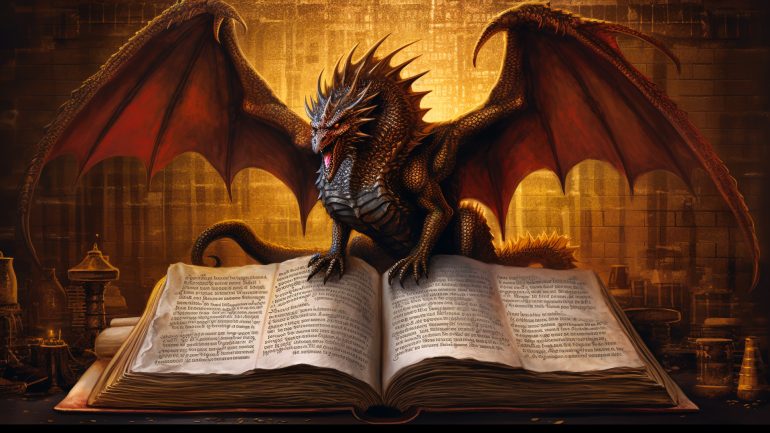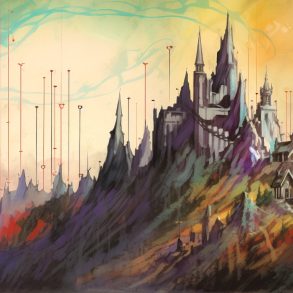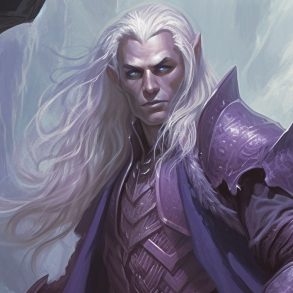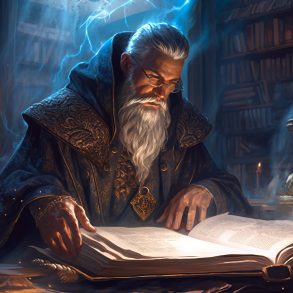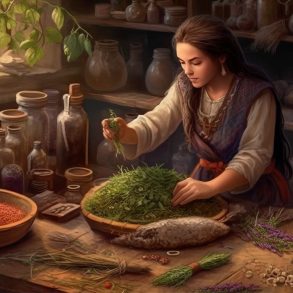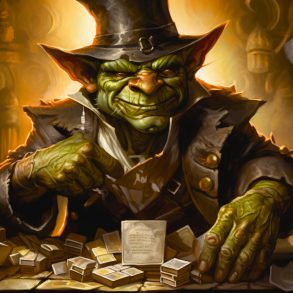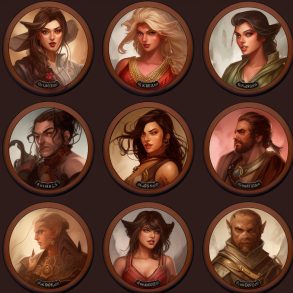Dungeons & Dragons is a game that generates a lot of jargon that can be very confusing. The lingo may even deter people who would like to try our beloved game, making it daunting to new players. Well, fear not adventurer, you’re in the right place to have said jargon busted open like the barbarian opens treasure chests with their axe. Keep reading to finally understand all those confusing terms with our DnD glossary!
For a full list of all books and their abbreviations, please see our comprehensive list.
DnD abbreviations & acronyms
4e – This can either refer to the 4th edition of the game, or the Four Elements subclass for the Monk.
AB – Attack Bonus, helps determine the total attack.
AC – Armor Class, this is the number that dictates how hard you are to hit with attack rolls. For example: if your AC is 13, then the Goblin shooting at you needs a 13 or higher to hit you.
AoA – Armor of Agathys, a Warlock spell from the PHB.
AoE – Area of Effect. Actions or abilities that can target a large area, instead of individuals e.g. Fireball.
AoO/AO – Attack of opportunity, a reaction creatures can take against someone leaving their threatened reach (the range of their melee attack, usually 5ft for PCs).
AS – Action Surge, a Fighter ability.
ASI – Ability Score Increase, a class feature available to every class that allows you to increase your ability scores or take a feat.
AT – Arcane Trickster, a spellcasting Rogue subclass
BBEG – Also known as the Big Bad Evil Guy (or Gal), this is essentially the boss of whatever story you’re playing through (or the overarching boss behind multiple adventures). You can think of it like this, in the first Harry Potter book/film, the bad guy is (spoiler alert!) Professor Quirrell, and each installment of the series normally has its own villain. The central villain of the entire series however, is Voldemort and this is who needs to be defeated in order for the good guys to truly win.
BI – Bardic Inspiration, a Bard class feature and resource.
BoH – Bag of Holding, an iconic magic item from the basic rules and DMG.
CBE – Crossbow Expert, a feat from the PHB.
CP – Copper pieces, a denomination of currency.
CR – Challenge Rating, level at which a 4 player party would be decently challenged by a monster.
CW – Cure Wounds, a healing spell from the PHB.
DC – Difficulty Class is the number needed to be met or exceeded to succeed at something. This relates either to saving throws or skills.
DD – Defensive Duelist, a feat from the PHB.
DDB – DnD Beyond, a popular website designed to encompass almost everything 5E players need to play online.
DnD – Dungeons & Dragons, the TTRPG published by Wizards of the Coast.
DM/GM – Short for Dungeon Master or Game Master, this refers to the player who is in charge of the world, the NPCs that inhabit it, the unfolding story within the game, and who arbitrates the rules that allow you to play in it.
DMPC – A character that the DM plays within the party, this is usually the result of the person both wanting to play and DM and has a lot more involvement on the DM’s part than a typical NPC.
DW – Dual Wielder, a feat from the PHB.
EA – Elven Accuracy, a feat from Xanathar’s restricted to elves.
EK – Eldritch Knight, a spellcasting Fighter subclass.
EP – Electrum pieces, a denomination of currency for punishing your players.
FR – Forgotten Realms. The main setting of most 5E modules.
GP – Gold Pieces, a denomination of currency.
GWM – Great Weapon Master, a feat from the PHB.
HAM – Heavy Armor Master, a feat from the PHB, and delicious.
HBC – Hexblade’s Curse, a feature of the Hexblade Warlock patron.
HD – Hit Dice, a number of dice rolls to determine the amount of health points of a character or monster and subsequently the kill difficulty.
HM – Hunter’s Mark, a Ranger spell from the PHB.
HP – Short for Hit Points, the life force of your character so to speak, if you drop to 0hp then you’re officially dying! This is described as being a combination of physical and mental durability, the will to live and luck. This means getting hit doesn’t necessarily mean getting stabbed per se, it could be a sloppy block that rattled your bones and left you out of sorts. Some tables prefer a more thematic use where damage is actually an injury, this can lead to more epic imagery when battling.
HW – Healing Word, a healing spell from the PHB.
LFP – Looking for Players, used in looking for game listings.
LFG – Looking for Group, used in looking for game listings.
LR – Long rest, a rest that takes at least 8 hours as standard and usually involves sleep.
MAD – Multi Attribute Dependent, typically used to refer to multiclassed characters that rely on multiple stats being 16 or higher. This can also refer to some single classes, like the Paladin and Barbarian.
MAM – Medium Armor Master, a feat from the PHB.
MTG – Magic: The Gathering, a card game made by WoTC, likely used in reference to the crossover setting books: Guild Master’s Guide to Ravnica and Mythic Odysseys of Theros.
NPC – A term also found in video games, it stands for Non-Player Character and means anyone controlled by the DM, not another player.
OoC – Out of Character. Players tend to use this both in text and verbally to speak to their group about whatever is going on in their campaign that they don’t wish to relay as their character. This can happen for several reasons, such as planning, and asking questions their character might know but the player may not be aware of.
OP – Overpowered.
P2P – Pay to Play, a type of game where the players pay a professional DM to run the game for them, commonly used in looking for game listings.
PAM – Polearm Master, a feat from the PHB.
PB – Proficiency Bonus, a character advantage on one of their skill checks, saving throws or attacks to reflect the extensive training and focus they have put into that area.
PbP – Play by Post, a form of playing the game through text over a longer period of time. Usually done on forums, discord servers and in email.
PC – Player Character; the character you created and control.
PP – Platinum pieces, a denomination of currency. This can also refer to Passive Perception, the default perception score your DM can use.
PvE – Player vs Everyone/Environment.
PvM – Player vs Monster.
PvP – Player vs Player. New DMs should note that whilst an impromptu duel between players may seem fun, PvP battles often occur from in-character disagreements, and may end up disrupting the group synergy.
RAF – ‘Rules as Fun’ interpreting (ruling or altering) the rules in the way that leads to the most fun experience for the players, e.g. ‘there’s no RAW way for you to do that epic stunt in the middle of a battle, but it sounds cool so give me an Athletics check!’
RAI – ‘Rules as Intended’ this refers to interpreting the rules as they are meant to be used, rather than just how they’re worded. This can be decided by looking to sources such as the Sage Advice Compendium (SAC, an official repository of rulings by the lead rules designer), the Twitter feeds of DnD design staff (not official rulings), or just the judgement of the DM/players.
RAW – ‘Rules as Written,’ refers to interpreting the rules of the game strictly by how they’re written in the official books, even if this leads to a silly conclusion.
Res:x – Resilient, a feat from the PHB, where x is the stat chosen for the feat.
RP – Roleplay.
SAD – Single Attribute Dependent, this refers to only needing to have one stat high/maxed out to perform well, examples of this include most Rogues and the Hexblade Warlock.
SD – Superiority Die/Dice, a resource used to power Battle Master maneuvers.
SP – Silver pieces, a denomination of currency.
SR – Short rest, which normally takes one to four hours.
SS – Sharpshooter, a feat from the PHB.
ST – Saving Throw, an attempt to avoid an effect.
SW – Second Wind, a Fighter feature.
TPK – Total Party Kill, where everyone in the party is either outright killed or dropped to 0hp.
TSR – Tactical Studies Rules, the original publishing company of DnD founded by Gary Gygax and Don Kaye.
TTRPG – Tabletop Role Playing Game, a category of game that DnD fits into.
TWF – A fighting style from the PHB, may also be used to refer to fighting with two weapons in general.
UA – Unearthed Arcana, playtest material that’s released for free on the official DnD website.
WC – Warcaster, a feat from the PHB.
WotC – Wizards of the Coast, the company that owns and creates DnD and Magic: The Gathering.
XdY – A way of showing how many of a certain die to use, where X is the number of dice and Y is the type. For example 3d6 is 3 6 sided dice.
XP – Experience points, a method of leveling up.
DnD terms & slang
3rd Party – A company that produces 5E products that is not WotC, an example of a company like this is Kobold Press.
Action Economy – Term covering all available things you can do on your turn: action, bonus action, movement, and object interaction. Usually used when talking about maximising your per turn use of those things.
Advantage – A game mechanic that allows you to roll two d20s and take the highest roll
Adventure – A story arc your characters play through that can be your entire game, or put together with other adventures to make a longer campaign.
Arcane – Magic that does not use a divine source, Bards, Sorcerers, Warlocks, Wizards, and the Eldritch Knight, and Arcane Tricksters subclasses for the Fighter and Rogue respectively are Arcane casters. Arcane magic is normally more varied than divine magic.
Backstory – What has happened to your character prior to the beginning of the game.
Bardadin – A Bard/Paladin multiclass.
Battlemap – A map used for combat, usually with a 5ft square grid overlaid onto or incorporated into the map itself.
Beer and Pretzels Game – A style of campaign where rules are loosely used and play is very casual, roleplay is often secondary to combat in this type of game.
Bonus Action – Used by certain abilities or spells, such as Misty Step, Cunning Action, and the two weapon fighting rules. Less common and more restricted in uses than a normal action.
Botch – Also known as a crit/critical fail, this is when you roll a 1 on an attack roll.
Buff – To provide a benefit to a creature that is not healing; the spells Bless and Haste from the PHB are examples of buffing spells.
Campaign – This is the wider story/overall game you play with your character. Each campaign can consist of multiple adventures, but one adventure isn’t necessarily a campaign on its own. For example, if you played Lost Mines of Phandelver, and then jumped into Storm King’s Thunder at 5th level then that is one campaign, but has been built of multiple adventures.
Carousing – An activity that can be summed up as socialising and mingling, commonly includes drinking in taverns, attending social functions, gambling and so on. Usually done for fun, to maintain in character appearances or to establish connections with NPCs.
Chargen – Short for Character Generation, referring to when you are creating your character.
Cheese – Used to refer to effective tactics that rely on any of the following: known overpowered abilities, combining features that weren’t intended to be combined, interpreting RAW in a favorable but obviously not in a RAI way, using abilities that clash thematically. Usually used in a negative manner, can be a source of distaste or disagreement between some players.
Coffeelock – A Sorcerer/Warlock multiclass that focuses on not long resting, in order to stack spell slots created by converting Pact Magic spell slots into Sorcery Points, and then into Sorcerer slots.
Controller – A character built around using control spells to manipulate the battlefield. Examples of such spells from the PHB are Grease, Web and Spike Growth.
Core/Core Rules – This refers to any content within the three core books of the PHB, DMG, and MM
Crit – Short for Critical hit, this is when you roll a 20 on a d20 during an attack roll. Criticals only exist in attack rolls by RAW, not saving throws or ability checks.
Crunch – The yin to fluff’s yang; crunch refers to the rules of the game, using the above example: the description of your runic armour is cool, but the fact that it’s mundane plate is what actually matters mechanically and sets your AC accordingly.
Dead Level – A level in a class that doesn’t offer any meaningful benefit.
Dead Stat – An odd numbered ability score, as it doesn’t increase the modifier.
Debuff – To impose a hindrance on a creature; Blindness/Deafness and Bane are examples of debuffing spells form the PHB.
Dirty 20 – When the number you roll on a d20 and your modifier adds up to 20.
Disadvantage – Like advantage but bad, this is when you roll two d20s and take the lowest result. Not to be confused when the dice gods have forsaken you.
Divine – Any spell, ability or caster that derives their power from a deity or holy source. Clerics, Druids, Paladins and Rangers are considered divine casters. Healing magic is a common example of a divine effect.
Downtime – A period of time between adventures, or during a lull mid adventure, where players can pursue personal projects. Examples of downtime activities include: shopping, carousing, working a mundane job, building or buying a player home/base etc.
Dump Stat(s) – An ability score (or multiple) you put your lowest number in (or don’t invest any points into). Commonly used to handle multiclassing requirements and poor stat lines.
Dungeon Crawl – A specific style of combat-heavy play where the party work through a ‘dungeon’ (this can be a literal dungeon, but is used as a more abstract term for a hostile environment), which usually involves searching individual rooms, traps and encounters. This style of play can involve sleeping in the dungeon if required (and safe to), carrying all loot out at the end. Dungeon crawling was a more common style of play in the early editions of the game.
Dungeon Ecology – When thought is put into how a dungeon would naturally exist; for example, how the various factions of monsters would interact, sources of food, and so on.
Encounter – A situation where players need to solve a problem in order to proceed, the most common form of encounter is combat. Social and exploration encounters also exist, and challenge the players in other ways (e.g. convince the king to send aid or how to cross this 100ft wide chasm, respectively).
Five Minute Workday – A term referring to the tendency of some groups of players to long rest (or try to) after a very little amount of time, possibly a single combat encounter. More prevalent in a party consisting of long rest dependent classes (like Wizards, Paladins, etc.) and inexperienced players.
Fluff – This a shorthand term for any narrative or descriptive text that has no actual mechanical bearing on the game. Your armor can be engraved with an elaborate formulation of ancient runes, intended to harness the raw power of rage and violence itself, and bolster the effectiveness of your holy water quenched aegis. That sounds cool and impressive, but it means nothing when the monster rolls to attack you. Pretty much everything in the game has its own story, description, its own fluff, but as it doesn’t have any impact on the game, you can change it to whatever fits your character best (though check with your DM).
Fudge – When a DM ignores the result of a die roll and chooses the result instead, only possible when rolling privately. This can be done to increase the challenge the players are facing if the combat is proving too easy, or to spare them if dice rolls (or bad encounter design) is making it too difficult.
Fullcaster – A class that gets spellcasting at first level and ultimately gets 9th level spells.
Gish – A character that uses magic to enhance their martial combat, originally taken from the Githyanki Gish monster entry. Examples of a gish subclass from the PHB are the Eldritch Knight Fighter and the Bladesinger Wizard (found in the SCAG and TCoE).
Glass Cannon – A character or creature that has a strong offense, but weak defenses/low hp.
Grimdark – A campaign that is dark and gritty in theme, this can be a tongue in cheek or derogatory way to refer to a campaign done poorly in this fashion. Derived from the Warhammer 40k game.
Grognard – French for ‘the old guard’ it refers to older players that started playing the game in older editions, usually 1st or 2nd edition. It can be used negatively if the player is set in their way about an older style of play, but in more recent years has become more of a generic term for players that started in the older editions. Players from 3rd and 4th edition are usually not considered Grognards, though as years pass this could change.
Halfcaster (½ caster) – A class that gets spell casting at 2nd level and only reaches a maximum of 5th level spells. These classes do not typically get cantrips when they gain their spellcasting feature. Currently, Paladin and Ranger, some consider the Artificer to be a half caster.
Hex Crawl – A type of campaign where the players explore a world map divided by a hex grid. This type of campaign often utilises randomly generated encounters more often and puts a larger emphasis on exploration, such as time and resource management.
Hexadin – Multiclass between a Hexblade patron Warlock and a Paladin.
Homebrew – A game option that is created by a DM or player, not published by WoTC or another game company. Often found for free on forums or sold on stores like the DM’s Guild.
Houserule – A DM deciding a rule works better differently than written/intended, or creating additional rules. Not to be confused with a ruling.
MacGuffin – Need a sword forged by the gods themselves to stop the rising of an ultimate evil? Perhaps a tome filled with lost eldritch knowledge to seal shut the gates of the Abyss? It doesn’t really matter what it is, if it’s a central item that is important to the story/saving the world, then it can be considered a MacGuffin. This is a very meta way of thinking of a narrative and will mostly be found in DM discussions or abstracted discussions about the game as a whole but not a particular story.
Melee Range – The range a creature can use a melee attack against another creature, typically but not always, 5ft.
Mega Dungeon – A dungeon of immense or endless size, large enough that an entire campaign could happen within it. Mega dungeons often lead to their own style of play, routinely leaving to a nearby town to resupply and sell loot, or using settlements that exist within the dungeon itself. Undermountain is an example of a mega dungeon and the setting for the Waterdeep: Dungeon of the Mad Mage adventure.
Metagaming – Using knowledge available to you as a person to make or influence decisions in-game, where your character may not have any reason to know such a thing. An example of this, is targeting the weakness of a monster because you have fought it in a different game, or read its statblock. This is usually negatively received by other players and the DM. An example of metagaming that is permissible by more DMs is when the players strategise what to do by discussing the abilities of their various characters in game terms. This is seen as more reasonable as the characters should be aware of what each other can do and talking out of character is easier and faster.
Minionmancy – A style of play that revolves around summoning, creating, and controlling other creatures. Examples of this are the Necromancer Wizard and Circle of the Shepherd Druid.
Modifier – Also known as mod, is the number you add to your rolls, determined by your ability score. This can also determine how often you can use some abilities.
Monty Hall/Monty Haul – A type of campaign centered around gathering as much wealth/magic items as possible, or a game style where that may not be the focus, but loot is very generous.
Movement Speed – How far a character or creature can move in a single turn; this can be affected by spells, abilities, and other effects.
Munchkin – A derogatory term for an immature player that wants to ‘win’ in a collaborative game, often by exploiting rules and cheese. Sometimes misused towards players that enjoy building mechanically effective characters.
Murderhobo – A style of player behaviour that focuses on killing everyone and looting everything. This type of player usually doesn’t engage in other methods of resolution, such as avoiding combat, or roleplay solutions.
Mythic Dungeon – Counter to Dungeon Ecology, a mythic dungeon may be given a supernatural reasoning (a god created it etc.) for existence, but usually just ignores reasoning behind what kind of creatures inhabit a dungeon (allowing unusual mixes of monsters to be used outside their typical environments), and how they coexist and survive (no food sources or supplies found etc.).
Nat20 – Rolling a 20 on a d20.
Nerf – To reduce the power or effectiveness of something, often in response to perceived game imbalance.
Nova – To utilise as many resources and abilities as quickly as possible to defeat an opponent. Examples of this include: A Battlemaster Fighter using their Action Surge and all of their Superiority Dice in a single turn; a Paladin using their highest level spell slots to Divine Smite each attack; or a Wizard using their most powerful spell. This usually happens on the first turn of combat, but can happen on any turn. Players prone to using nova tactics can often fall into the five minute workday style of play.
Object Interaction – Part of action economy, allowing you to minorly interact with an object, such as opening a door or drawing a sword.
Padlock/Pallock – Shorthand for a Paladin/Warlock multiclass.
Phylactery – The vessel for a Lich’s soul.
Player Agency – The ability for a player to make decisions, including describing some aspects of the world, situations, and so on.
Powergaming – To build a character to be as powerful/mechanically effective at something as possible. Usually but not exclusively referring to combat prowess. Can be used in a derogatory way towards players that enjoy creating effective and powerful characters.
Prof (Bonus) – Short for proficiency.
Rage – A core Barbarian ability.
Ribbon Ability – An ability that is solely to provide flavour to the class, race, feat, etc. that it is found in. They are not intended to be useful in combat and not considered by the WoTC to affect balance. Examples of ribbon abilities include Thieves’ Cant for the Rogue and Magical Tinkering for the Artificer.
Round – An in-combat measurement of time, one round is going from the top of the initiative order to the bottom (with the last PC/creature finishing their turn).
Rule Zero – The DM has the final say for how the game works and what happens, overruling any book and potentially disruptive/toxic player behaviour.
Rules Lawyer – A player that will argue RAW or RAI with the DM, usually for personal/party benefit, sometimes out of the perception that the DM or another player is getting something wrong.
Ruling – An interpretation of the rules by a DM to resolve a situation.
Save – Short for saving throw, a type of defense against effects that don’t target your AC.
Session 0/Session Zero – The first session of a new campaign. Used to discuss what everyone expects, whether anyone would like something to not come up in the game, to discuss characters, and perhaps roll stats. It’s common for this session to not include any playing of the game, but it can include a small roleplaying or basic combat at the end.
Slog – Term used to describe a back and forth fight with a high hp monster (or many monsters) lacking dynamic elements and feels boring or a drag.
Sorcadin – A Sorcerer/Paladin multiclass.
Sorlock – A Sorcerer/Warlock multiclass.
Sorlockadin – A Sorcerer/Warlock/Paladin triple class–depending on your DM, may also be known as ‘pushing your luck.’
Stormwind Fallacy – The misconception/fallacy that because a person power-games, they cannot roleplay effectively or vice versa.
Stunlock – A Monk using Stunning Strike on subsequent turns to keep an enemy under the Stunned condition, ‘locking’ them out of the combat.
Tank – A character with high defenses/survivability that intends to take hits on behalf of the rest of the party. Abilities that encourage enemies to attack this kind of character are classed as tank abilities, even though they do the opposite of increase defenses. A Barbarian is an archetypal tank.
Three Quarter Caster (¾ Caster) – A term coined for the Artificer, who only gets up to 5th level spells like a half caster. However, they get their spellcasting feature at first level and also gain cantrips.
Vanilla – A game using no homebrew/third party content and tries to keep as close to RAW/RAI as possible.
West Marches – A style of game where there is no set group of players or play time. Players assemble a group and set a time the DM then runs for, usually overlaps with a Hex Crawl style of game.
